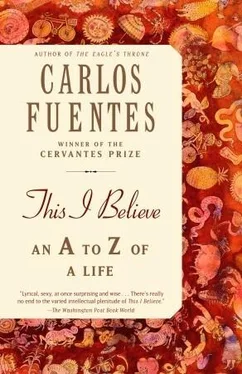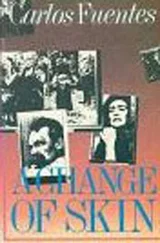In the same vein, Lledó also sees language as the active, creative link of society, and he bases this notion on four levels of evolution. The first is that of necessity: hunting, fishing, the need for communication as sustenance. Necessity creates language. Language creates images, and images can be reactivated by “all kinds of external and internal stimuli,” as he says in Lenguaje e historia ( Language and History ). At the second level, the city is the creator of symbols, and language becomes committed to paideia, the formative ideal of the human being, both personal and collective history. At the third level, language not only identifies, it connects, debates, revises. . And finally, in our own time, the homogenization of language returns to the identification between individual and social collective, and the price we pay is that of generating a forest of useless symbols.
From here, once again, we find ourselves before Wittgenstein’s “preventive virtue,” his arduous task of verbal cleansing, of linguistic hygiene. Wittgenstein is eternally aware of the “risk” that living and, therefore, thinking, implies. Most especially in matters of religion, he notes, “the honest thinker. . is like a tightrope walker. He seems to be walking on air. His support is the most fragile imaginable. And yet it is possible to walk upon it.”
This sentence echoes something Pascal once said: despite their best efforts, human beings are like tightrope walkers, forced to assume risk. People can choose to go to sea or stay at home, but nobody escapes risk. Like Wittgenstein and Nietzsche, Pascal is the philosopher of fragments and aphorisms. Like Wittgenstein and Plato, he questions the nature of language. Like Kafka, he condemns part of his work to silence, but unlike Kafka, he wagers that it will be found in a simple inventory of his meager possessions. Pascal’s Pensées were, in fact, found sewn inside an old shirt.
Pascal’s thousand fragments may be, in their aphoristic brevity, an ironic response to his criticism of the philosophical tradition. Montaigne once noted that the one issue that has troubled philosophers more than any other is the question of what constitutes sovereign good for man. Pascal, who constantly reelaborates and sequesters Montaigne’s writing, answers that there are “280 kinds of sovereign good in Montaigne.” Pascalian pessimism with respect to philosophical systems extends, prima facie, to human beings themselves. Man is a sorrowful enigma. The justice he imparts is wrongful. The more wealthy his life is, the more empty it becomes. Vanity—“gaming, hunting, visits, theater, false perpetuity of one’s name”—is the object of the most intense Pascalian disdain. “What a chimera then is man! What a novelty, what monsters! Chaotic, contradictory, prodigious, judging everything, mindless worm of the earth. Storehouse of truth, cesspool of uncertainty and error; glory and reject of the universe!” 7
Blaise Pascal was, as we know, a practical man. His early renown grew thanks to his scientific ingenuity and his pragmatism. He devised the first public transportation system in France. He invented the adding machine, the pascaline . And he discovered the laws of hydrostatic equilibrium. In addition, however, he may also be the person who turned a corporeal, physical organ — the heart — into the seat of knowledge and emotion. Symbol for love, name for central location, “the heart has its reasons, of which reason does not know,” as Pascal tells us. Skeptical of human reason and human institutions in general, Pascal turns to the heart in the hope of finding a dimension of the human being that reason cannot completely encompass or grasp. Pascal makes reason complete with three reasons that could well be — when seen from a certain perspective — those of Wittgenstein. The heart says those things that cannot be said rationally. That other knowledge tormented Pascal because the young French philosopher believed that there was a void there, an abyss that encroaches upon us in two ways. As the discoverer of hydrostatic equilibrium, Pascal the physicist is aware of the void’s existence. “The eternal silence of these infinite spaces frightens me,” he said.
But then Pascal turns the physical void into a void of the soul, and asks himself, “What can fill it, what can balance it?” Pascal is the philosopher who inches precariously — once again, the tightrope walker — between void and plenitude. His thought emerges from the void and inserts itself into society, religion, and history. His perspective could not possibly be more pessimistic. God is hiding from us. Nature is corrupt. “Larceny, incest, infanticide, parricide, have all been accounted virtuous deeds. . Justice, like finery, is dictated by fashion. . Thus opinion is the queen of the world, but might is its tyrant.” And then, in the final analysis, he observes that “might is the sovereign of the world, and not opinion.” And even when opinion prevails over might, opinion itself will become the enforcer of might. At his most pessimistic, he states that this world “is not the land of truth. It wanders unknown among men.”
Pascal does, however, warn us that the political order is supported by physical, not spiritual, realities. And that is a virtue, insofar as corporeal realities are identifiable and can justify obedience. There is an implicit deceit in political life. The majority of people obey because they believe that the legal order of things is just, and would rebel against it if they perceived it to be arbitrary. For that reason, governments prefer to maintain the illusion and, occasionally, even fantasies — the opiate of the people, to make a pre-Marxist allusion. As an observer of politics, Pascal fears “the art of opposition and of revolution” and rejects the idea, pre-Rousseauian as well, that it is possible to return to “the natural and fundamental laws of the State, which an unjust custom has abolished.” The people rise up. Power uses its advantage to further destroy the people. Sometimes it is “necessary to deceive men for their own good.”
It may seem as though I am criticizing the politically reactionary and realistic Pascal — Machiavelli after the fact. I am. But I also feel that I am making an inventory of sorts of the Pascalian skepticisms, which are those that emerge from the void, permeating society and history. Once there, having said all the negative things that can be said of the multitudes, government, power, revolution, and even a hidden God —le Dieu caché— and a corrupt nature, Pascal deposits his thoughts in the human race and conceives of them as a lifelong journey of gains and losses. The quality of this journey will depend upon the quality of the conscience of the person who learns — or does not learn — that “nothing is simple which is presented to the soul” (world, subject, society, politics, history) but that at the same time “the soul never presents itself simply to any object.”
God hidden. Nature corrupt. God forsakes us to blindness— until, that is, the arrival of Christ. All of Pascal’s thought, all his skepticism, all his irony, all his denial, are clearly directed toward an affirmation of Christ. The double path of man, his double passion — path and suffering — on Earth is what, in Pascal’s eyes, brings us all closer to the path of Christ himself on Earth, and through the Passion. I cannot help but feel certain that all the apparatus Pascal puts in place for our role as tightrope walkers is like a bridge that stretches out from the Dieu caché that forsakes not only Jesus but also all of humanity, and from Jesus himself. .
“Thou wouldst not seek me if thou hadst not found me,” says Christ in the disjointed Pascalian packages I continue to cite so copiously. That is to say: Pascal cannot and will not elude the question of faith, the question of the human being who believes. Not because of his allegiance to one or another religion, but because he searches for the most precious thing of all, the thing that he already carries inside him (the heart that knows the reasons that reason does not) and he searches for it, conscious that it begins at one demarcation point (birth) only to end at another (death). What determines the value of life for Pascal is not his probable religious affiliation but rather his faith in its most ample meaning: the conviction that we can be bearers of values that we wish to anchor in the world precisely because we ask ourselves the question “What else is there beyond this?”
Читать дальше












